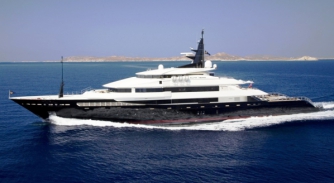Will Russian yachts be sold for Ukraine?
We speak to HFW's Daniel Martin to understand the legitimacy, plausibility and ramifications of government plans to tax seized Russian assets…

The superyacht industry is once again on the radar of government officials, as British Chancellor, Jeremy Hunt announced a new strategy to leverage seized and frozen Russian assets in support of Ukraine's war effort. Recently, the G7 detailed their intention to investigate methods for taxing profits from seized Russian assets, to aid Ukraine while adhering to international law.
In a superyacht context, what the UK government is proposing remains rather vague, yet sincere in the sentiment of doing more to bring an end to the ongoing conflict. Hunt says that exploring avenues beyond sanctions to hinder Russia's ability to finance its “illegal war” against Ukraine is a necessity.
Proposals such as this immediately evoke recent memories of the Antiguan government when faced with the seemingly abandoned Alfa Nero. But the British government isn’t necessarily proposing something as drastic as selling yachts and keeping the proceeds directly. Instead, the US Treasury Secretary, Janet Yellen and Hunt have signalled support of an EU plan for a windfall tax on profits generated by frozen Russian assets.
“The underlying principle of all sanctions is to impose effective but temporary restrictions against a regime and its supporters in order to bring about a change in behaviour,” Daniel Martin, Partner, HFW tells SuperyachtNews.
“Currently it is not entirely clear whether the UK government is seeking to sell frozen assets and donate the proceeds to Ukraine, or force a sale and donate to Ukraine any sums which would be due to the UK government while holding the proceeds of sale for the owner.”
Martin adds that the UK could also potentially gift Ukraine funds which the government is owed if income is earned by way of interest or other gains in a frozen account.
“Unless the UK intends to change the law to allow the sale of frozen assets, then it is unclear whether this latest development represents a significant development or will release significant funds to Ukraine,” he says.
Addressing the situation at the IMF's annual conference in Marrakech, Hunt disclosed that finance ministers from the G7 nations had been discussing the possibility of utilising “Russian sovereign assets to fund Ukraine's defence”. The ultimate goal is to convey a clear message to President Putin that his actions will ultimately become financially unsustainable.
Hunt maintains his commitment to acting within international law while collectively exploring options to address the war in Ukraine. However, though the US had contemplated using seized assets to support Ukraine's defence earlier in the year, it was determined to be legally unviable.
“Governments will of course need to ensure that they are acting within the law, and there are also several key issues which still need to be resolved for the plan to come to fruition,” says Martin. “For instance, current sanctions freeze rather than requisition assets, meaning that they remain the property of the original owner and the ability of governments to sell the assets is unclear.”
Even if assets can be sold, the proceeds of the sale would legally need to be paid into a frozen account in the name of the owner, so it is unclear what monies would actually be released and made available for Ukraine in the event of a sale.
There is also the risk of litigation following the contested sale of a seized asset. “The Government would want to legislate in a very clear and comprehensive way. You do not impose this kind of legislation and then find that it comes back to bite you in a litigation battle. Governments know what they are doing and would need to ensure that any challenge would not get very far in court,” adds Martin.
While the underlying policy seeks to prevent further bloodshed and aid the reconstruction of Ukraine, the plan proposed by the UK, EU and US governments has a long way to go before it will hold any legitimacy. Whilst a measure that allows the seizure and sale of assets might increase the pressure on Putin, it may also impede investment in the future if it is not executed correctly.
“It is very easy to look at all sanctions with a Russian lens at the moment, but we have to remember that sanctions have applied to other regimes in the past, and will certainly apply to others in the future,” says Martin.
“Governments will be weighing up the long- and short-term costs of any new measures, including the risk of discouraging future foreign investment in the UK. If investors fear that their interests could be sold in the future due to their nationality or a regime they are associated with, then that may discourage them from holding funds and other assets in the UK in the first place.
Profile links
NEW: Sign up for SuperyachtNewsweek!
Get the latest weekly news, in-depth reports, intelligence, and strategic insights, delivered directly from The Superyacht Group's editors and market analysts.
Stay at the forefront of the superyacht industry with SuperyachtNewsweek
Click here to become part of The Superyacht Group community, and join us in our mission to make this industry accessible to all, and prosperous for the long-term. We are offering access to the superyacht industry’s most comprehensive and longstanding archive of business-critical information, as well as a comprehensive, real-time superyacht fleet database, for just £10 per month, because we are One Industry with One Mission. Sign up here.
Related news

Damen sues Dutch government
Damen Shipyards is now pursuing compensation for significant financial setbacks attributed to the Russian sanctions
Business

Understanding VAT in yachting
Miguel Ángel Serra, Founding Partner of Legalley+, examines the complexities and misconceptions surrounding VAT in Spain
Business

Eric Schmidt retracts Alfa Nero bid
Amid constant legal battles, the former Google CEO has walked away from purchasing the superyacht, adding to the quagmire
Business

Amadea owner sued for millions
An Isle of Man court has ruled that the owner of the famous superyacht owes £36.8m in tax
Business

Phi owner loses UK court case
The detention of Phi has been deemed lawful by the UK High Court, despite the owner not being sanctioned
Business

Richard Masters avoids extradition
After a lengthy legal dispute, the high court in Madrid rejected the request from the District of Columbia
Business
Related news
Damen sues Dutch government
2 years ago
Understanding VAT in yachting
2 years ago
Eric Schmidt retracts Alfa Nero bid
2 years ago
Amadea owner sued for millions
2 years ago
Phi owner loses UK court case
3 years ago
Richard Masters avoids extradition
3 years ago
Alfa Nero auctioned for $67.6 million
3 years ago
NEW: Sign up for
SuperyachtNewsweek!
Get the latest weekly news, in-depth reports, intelligence, and strategic insights, delivered directly from The Superyacht Group's editors and market analysts.
Stay at the forefront of the superyacht industry with SuperyachtNewsweek



